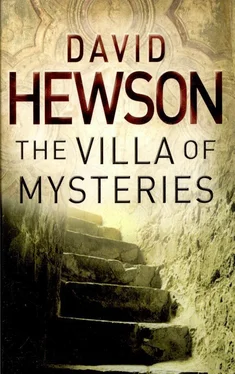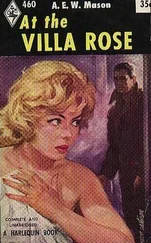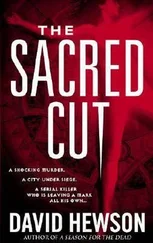“Get some footage in from the cameras in the Corso. Find out where that bike went afterwards.”
Bianchi hesitated. “Er, that’s some job, sir. You get no more than a hundred metres or so coverage from each camera. I’ve been through this before. All you can manage is about a kilometre a day, no more. If he’s gone any distance we’re talking a week, if we’re lucky.”
Falcone scowled and scanned the office again. “Give it a day. Maybe he didn’t go far.”
“Sure,” Bianchi said.
“And get a couple of pictures out to the media. Keep it low key enough not to start a panic. Just say she’s a missing girl and we’re looking for information. Say there’s no reason for concern just now but we’d like to hear from her, or someone who’s seen her, all the same.”
“It’s done, boss,” Bianchi said and picked up the phone.
Then Falcone went back to his desk, closing the door behind him, and looked at D’Amato. “So tell me something about Wallis I don’t know.”
Her eyes widened. “Are you serious? The position as I understand it is he won’t talk to me at all. And when it comes to having a meaningful conversation, he won’t talk to you either.”
“I don’t think he’s his own man in this,” Costa said. “Not completely. It’s as if he’s looking behind him all the time. Why’s that?”
She cast him a cold glance. She knew the answer. She wanted to make them work for it.
“Well?” Falcone demanded.
She swore quietly under her breath. “Wallis fell out big time with the hood he was supposed to befriend. Emilio Neri.”
“We know that,” Falcone declared impatiently.
“Perhaps,” she snapped. “But do you understand the implications? Both sides, the Americans and the Sicilians, had to come in and keep those two apart. Big people don’t like that. Wallis’s punishment was retirement. The punishment sticks. My guess is that if they think he’s messing around again with things he shouldn’t, even talking too freely to us, he’s in big trouble.”
“And this Neri guy?” Peroni asked. “I remember him from my beat. What was his punishment?”
“A slap on the wrist,” she said. “Neri was on his home turf. He was bound to come out on top. Besides… Neri’s a different kind of animal. Wallis is educated. He’s got limits. He was in this for business reasons, not some personal vendetta. Neri would rob his grandmother’s grave if he felt like it and go home to boast.”
None of this helped them understand what had happened to Wallis’s stepdaughter, Costa thought. Or where Suzi Julius might be now.
“What if Neri was involved with the death of the girl?” he wondered. “Maybe that was the way he punished Wallis?”
“Neri’s a thug,” Falcone said. “If he wanted to kill someone, he’d kill Wallis himself.”
He nodded at D’Amato. “You’re wrong if you think Neri doesn’t have a code, by the way. Men like him still have some rules. They need them to maintain their position with their troops. Killing a teenage girl to punish another hood… It doesn’t look proper. It would damage his standing. Besides, he’d have to let it be known he’d done it, otherwise why bother? If he’d taken responsibility we’d have heard.”
“There’s still plenty of reasons to talk to him,” she suggested. “No harm done.”
“I get it! I get it!” Peroni said, a little too loudly. “That means, of course, the DIA still have to tag along because we got the mob in the loop. And if it’s just a plain murder inquiry it’s nothing to do with you.”
She shot him a savage glance. “I’m trying to help! Will you people kindly stop treating me like I’m the enemy?”
Peroni looked out the window and whistled.
“And the girl?” Costa wondered. “Suzi Julius? Where does she fit in?”
Falcone looked at the image frozen on the TV screen, of the Campo, with Miranda Julius static, staring at the route the bike had taken from the square. “I wish to hell I knew. Let’s hope she’s just another runaway kid. I don’t see how we can treat this as anything else but a missing teenager inquiry until I see something that says different. If there’s any indication this is something more—and I mean any —I want to know about it instantly. Until then…” he made sure Costa looked at him, “… let’s get our priorities straight. We have a murder case on our hands and that’s what we focus on. It’s the only thing we know for sure right now.”
“Suzi Julius is still alive—” Costa couldn’t get the picture of the mother’s face out of his head, all the pain there, and the fearful anticipation.
“I know that,” Falcone said firmly. “We’re doing all we can, Nic.”
“And we’re in too?” D’Amato asked. “You know the rules, Leo. This involves organized crime. Like it or not, the people you’re talking about here have been up to their necks in it for years. Neri, for one, still is.”
“Yeah, yeah. You’re in.” Falcone looked at his watch then looked at her. “Provided it’s share and share alike. Understood?”
She smiled. “How could it be otherwise?”
Falcone rose from his chair and the three of them got ready to follow him. “Let’s talk to the harpy in the morgue about that body. This report is skimpy and she knows it.”
Costa punched his phone back on as they left the room. He didn’t like losing the call. He didn’t want to be out of touch with anything for a moment.
It came alive halfway down the corridor, ringing straightaway. Teresa Lupo’s voice was so loud it almost hurt his ear.
There was a single, snatched message then the line went dead.
STUPID THINGS COME NATURALLY in some circumstances.
You think about throwing an ancient PC monitor through the jammed window of a dead academic’s portable office, knowing all along the frame was too small for you to squeeze through even if you succeeded.
You sit in a fake Roman villa on the Janiculum Hill and try to remember what it was like in the days when you had to scheme to stay alive.
And, in the case of Emilio Neri, whose phone had burned long and hot that afternoon, you storm around your rich man’s palace in the Via Giulia, amazed at the way the past can resurrect itself out of nowhere, cursing your errant son and your profligate wife, wondering where the hell they were when you needed to yell at them.
Fear and fury share the same ill-defined borders. Watching the door handle twist just an arm’s length away from her, Teresa Lupo felt both mad and scared as she tried to force some sense and reason into her head. Then blunt instinct took over. She stood to one side, by the hinges, gripping the puny hammer with both hands, waiting.
It took no more than a moment. The lock turned, the door began to open, slowly. She held her breath, wondering what he was expecting: a figure cowering in the corner. That had to be it.
“I don’t cower,” she whispered to herself, and waited until he’d pushed it to forty-five degrees, enough, she guessed, to get his body positioned in the potential vise between the door edge and the frame.
She had a pathologist’s muscles. She was carrying some excess weight too. She snatched some air into her lungs, stepped back briefly, then lunged with her shoulder into the centre of the plywood slab. It closed on the rider’s body. She bounced harder. Someone screamed: high-pitched, pained. Teresa Lupo darted round the edge of the door and saw him: a black figure in leather, face invisible behind the dark visor of the helmet. He was crouching, clutching his chest. Maybe she’d broken a couple of ribs. She hoped so. A long black pistol lay on the grubby office floor where he’d dropped it. She stabbed at the thing with her foot, was dismayed to see it slide only a metre or so away from him. Then she threw aside the hammer, grabbed the creep by the back of the helmet and yanked hard.
Читать дальше












